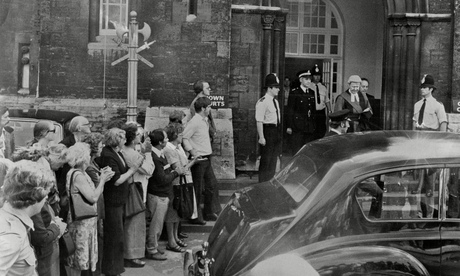
Right at the beginning of this memoir of William Mars-Jones, a distinguished high court judge, Adam Mars-Jones describes moving into his parents’ house at Gray’s Inn, London, to help care for them. At the time, his father was slipping into vagueness rather than dementia. His mother was dying of cancer, “something she did with self-effacing briskness in little more than a month”. He describes how his mother became worried about where her ashes would be stowed while waiting for her husband to join her (the plan was to be interred together in Llansannan, Wales, where Mars-Jones senior was born).
Adam Mars-Jones comes up with a solution – a bit of domestic gallantry. He suggests he keep them in the top of a cupboard, which, one is slightly surprised to hear, closes the matter: “This little piece of symbolic hospitality was enough to bring her peace of mind.” And, once she is gone, he describes the feeling that she has died with “nothing left undone or unexpressed”. He explains: “She seemed absent without being missing, and mourning was beside the point. It didn’t match anything I felt.” His mother (whom he says he most resembles) seems, like her ashes, to be easy to stow as a subject (the relationship is explored at tender and more complicated length in his contribution to the 1997 Virago anthology Sons & Mothers).
His father, by contrast, seems unstowable: there is to be no tidying away or easy summing up. Since Edmund Gosse’s Father and Son was published in 1907, there have been many memoirs written by sons about their fathers: Philip Roth, Michael Frayn, Blake Morrison, Rupert Christiansen and Patrick Lane have all attempted it, and Mars-Jones (who has borrowed from John Mortimer’s autobiographical play for the subtitle of his book) joins this company with an entertaining, tricky, nuanced portrait. Judging a judge is a delicate sport – actual judgment is left to the reader. Used to having his way in court, William Mars-Jones’s reflex was to hold sway over family. In a household where conversation tended towards argument, he was the martinet, needing to win. He could be mercilessly dismissive. His nickname for Adam’s younger brother was comically unhelpful: “Nogood Boyo.”
It is easy to see this memoir as a seizing of filial advantage, a way of getting in the last word (finally!), of speaking for as well as about his father. But Adam Mars-Jones is mindful of the dangers of the posthumously unassailable position. His portrait is respectful as well as being undeceived. It is essentially benign. He finds himself wondering, as his father loses his grip in old age, whether his character has been a “long charade, both professional and familial, undertaken between the dreaminess of his own childhood and the undefended state to which he was returning”. The account (almost an aside, told without swanking) of caring for his father is especially touching. He reproaches himself mightily when his father gets a sore on his heel. As he is changing the dressing, his father says, “Dear Adam”, which completely takes him aback.
His father’s career as a barrister is entertainingly revisited. He defended Kevin McClory, who took Ian Fleming to court for stealing work he had done for a James Bond screenplay and sported Savile Row suits with 007 embroidered inside their breast pockets. He spoke up for Gilbert O’Sullivan, the singer-songwriter, who naively signed his rights away in a contract he did not understand. He was junior counsel for the prosecution of Ian Brady and Myra Hindley in 1966. But this show-casing of cases is not aimless. Adam Mars-Jones seeks to understand how “different his world was from mine. He also encouraged me to think of myself as a potential lawyer, but it isn’t so.” And yet, as a virtuoso critic, he thinks he may be regarded as “a proponent of capital punishment. Not just a hanger but a flogger too.” That would make him more hardline than his liberal dad.
Ultimately – inevitably – it is his father’s judgment of him that is most at stake. He wishes he could have persuaded his father to see him not as a “butterfly brain” but as “something much more useful, a bee brain”. His description of bravely coming out one New Year’s Eve (when his father was still hale) is the most involving part of the book. “If there were an annual general meeting of the Homophobia League then he would be an honoured guest, if not a keynote speaker…” Mars-Jones senior tries all sorts of strategies to persuade his son he is not gay – case not closed until he deems it closed. But then, towards the end of his life, he undergoes a sea change, unexpectedly restyling himself as a pro-gay rights man. One of his favourite commands to his sons used to be: “Rally buffaloes!” Now he is rallying. Does Adam Mars-Jones rejoice? No way: he rages against this reinvention, finds it suspect, too easy. (“Dad had to go too far.”) For above all, we require our parents to be themselves and not slip out of character. Or, as he puts it, “Barnacles don’t just slip off the hull.”
Kid Gloves is published by Particular Books (£16.99). Click here to order it for £12.99

